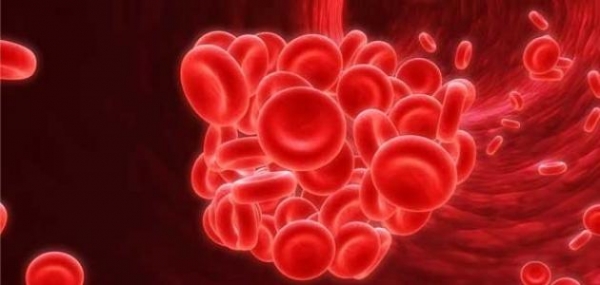Hanna Saadeh - Pernicious Anemia
Foods derived from animal sources such as fish, eggs, meats, and dairy products, contain trace amounts of the Vitamin B12 we need. But to absorb this vitamin we also need a special carrier, which binds to the vitamin in our intestines and transports it into our bodies. Without this special carrier i.e. Intrinsic Factor, which is synthetized by the acid producing cells of our stomachs, we will not be able to absorb the Vitamin B12 in our intestines, leading to the serious deficiency state aptly known as Pernicious (i.e. deadly) Anemia.
Causes of Vitamin B12 deficiency have to do with diets, medicines, and with diseases of the stomach and small intestine. a) Diets: Strict vegetarians, starving populations, and fanatic dieters, who do not eat enough animal products, are unable to synthesize enough Vitamin B12 in their intestines to satisfy their needs. b) Medicines: Certain diabetes pills such as Metformin and all potent acid reducing pills can also lead to Vitamin B12 deficiency after prolonged use. c) Stomach: Obese patients who have had a stomach bypass and patients with stomach atrophy either due to age or due to certain autoimmune diseases that attack their stomach cells, will not be able to produce enough of that special stomach carrier i.e. Intrinsic Factor to absorb the Vitamin B12. d) Intestines: Patients with diseases of the last part of the small intestine i.e. Ileum, where the Vitamin B12 is normally absorbed, may become deficient if the ileum’s absorptive surfaces are disrupted by disease.
The consequences of Vitamin B12 deficiency are serious and varied, and include: eye atrophy, trouble smelling and tasting, mouth and tongue sores and inflammations, infertility, anemia, brain and spinal cord degenerations, mood disorders, dementia, forgetfulness, balance problems, nerve numbness, weakness, fatigue, bowel and bladder incontinence, fainting spells, bone marrow failure, growing up problems, blood clots, etc.
The commonest cause of Pernicious Anemia is autoimmune gastritis, which causes destruction of the acid producing cells of the stomach, i.e. the Parietal Cells. Other autoimmune diseases associated with Pernicious Anemia are diabetes mellitus, thyroid disorders, and vitiligo.
The prevalence of Pernicious Anemia ranges from 50 to 4000 cases per 100,000 persons. Even though all ages are affected, it is commonest in those who are 70 to 80 years old because they have the highest incidence of stomach atrophy i.e. Atrophic Gastritis. Stomach acid is needed to release the Vitamin B12 bound to the animal proteins we eat. Stomach atrophy, by lowering stomach acid production, impairs the release of Vitamin B12 from foods and leads to poor absorption of this vitamin in 20% of elderly individuals.
The diagnosis of Pernicious Anemia is not easy because measuring the Vitamin B12 level is not always reliable. Other tests, which measure the metabolic consequences of Vitamin B12 deficiency, such as Methylmalonic acid and Homocysteine, are more sensitive and specific. However, because Homocysteine can be more influenced by other conditions such as renal disease and Folic Acid deficiency, a high Methylmalonic acid level is now considered the more specific indicator of Vitamin B12 deficiency.
The treatment of Pernicious Anemia is to give pharmaceutical doses of Vitamin B12. Giving Vitamin B12 by injection is easy and effective, but it can also be given by mouth with equal success. The effectiveness of oral treatment relies on giving big enough doses of Vitamin B12 to allow sufficient amounts of the vitamin to pass through the intestinal barrier without the help of the special stomach carrier i.e. the Intrinsic Factor. This can be readily achieved by giving 1000 to 2000 units of Vitamin B12 daily. Whether the injection or the oral route is chosen, the treatment is usually given for life because most causes of Pernicious Anemia are not reversible.
Vitamin B12 is a popular supplement taken by millions of people. When used in the absence of deficiency, it may not be safe if the amount taken raises the Vitamin B12 level above normal. A recent study has shown an increased incidence of cancer when Vitamin B12 is overdosed.
In patients with combined Vitamin B12 and Folic Acid deficiencies, giving Folic Acid alone can cause a catastrophic brain and spinal cord degeneration. In the US and Canada, Folic Acid deficiency is uncommon because foods are fortified. However, in countries where Folic Acid deficiency might be prevalent, Vitamin B12 should always be given with Folic Acid to avoid this catastrophic brain and spinal cord degeneration.








Leave A Comment